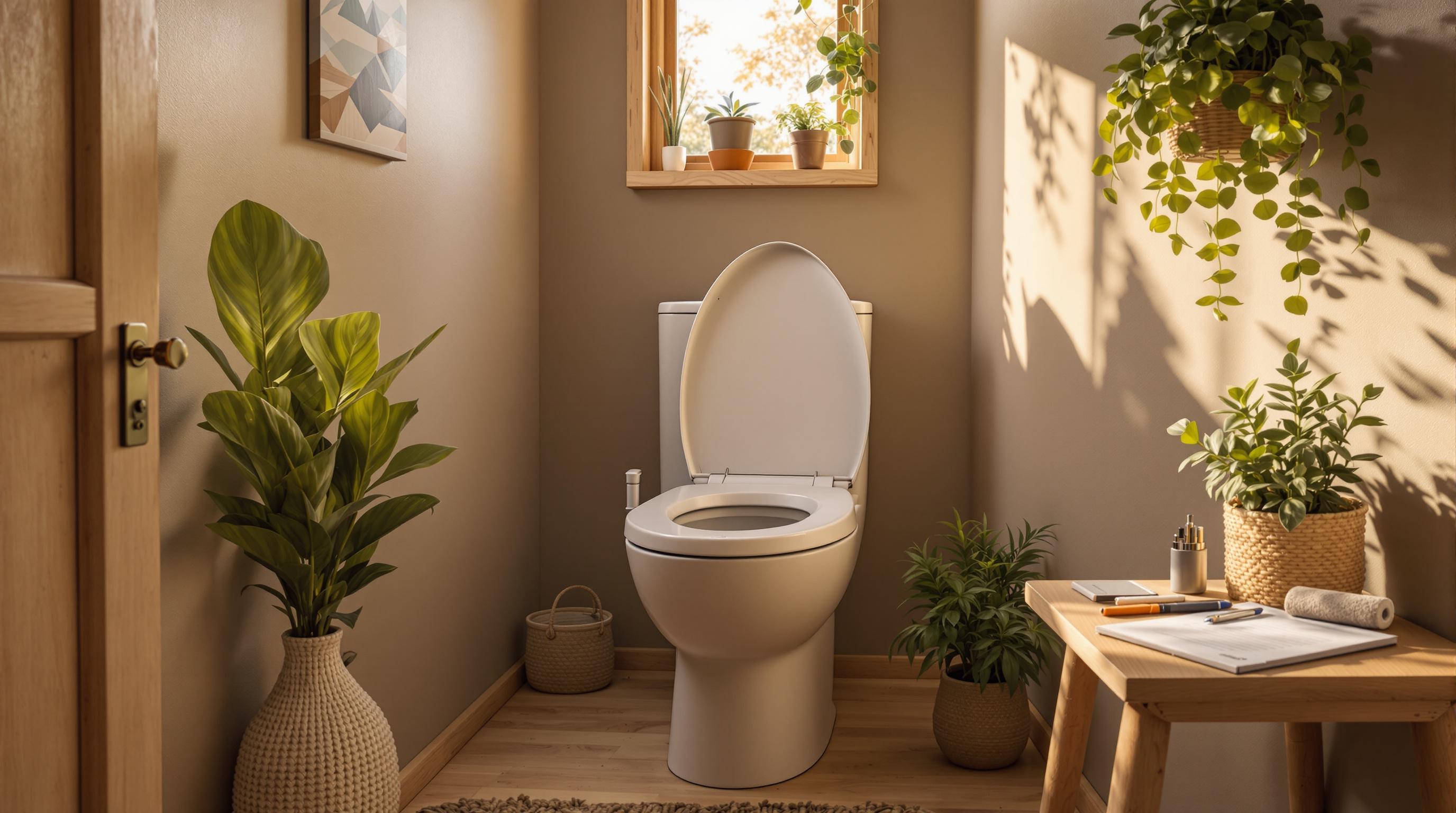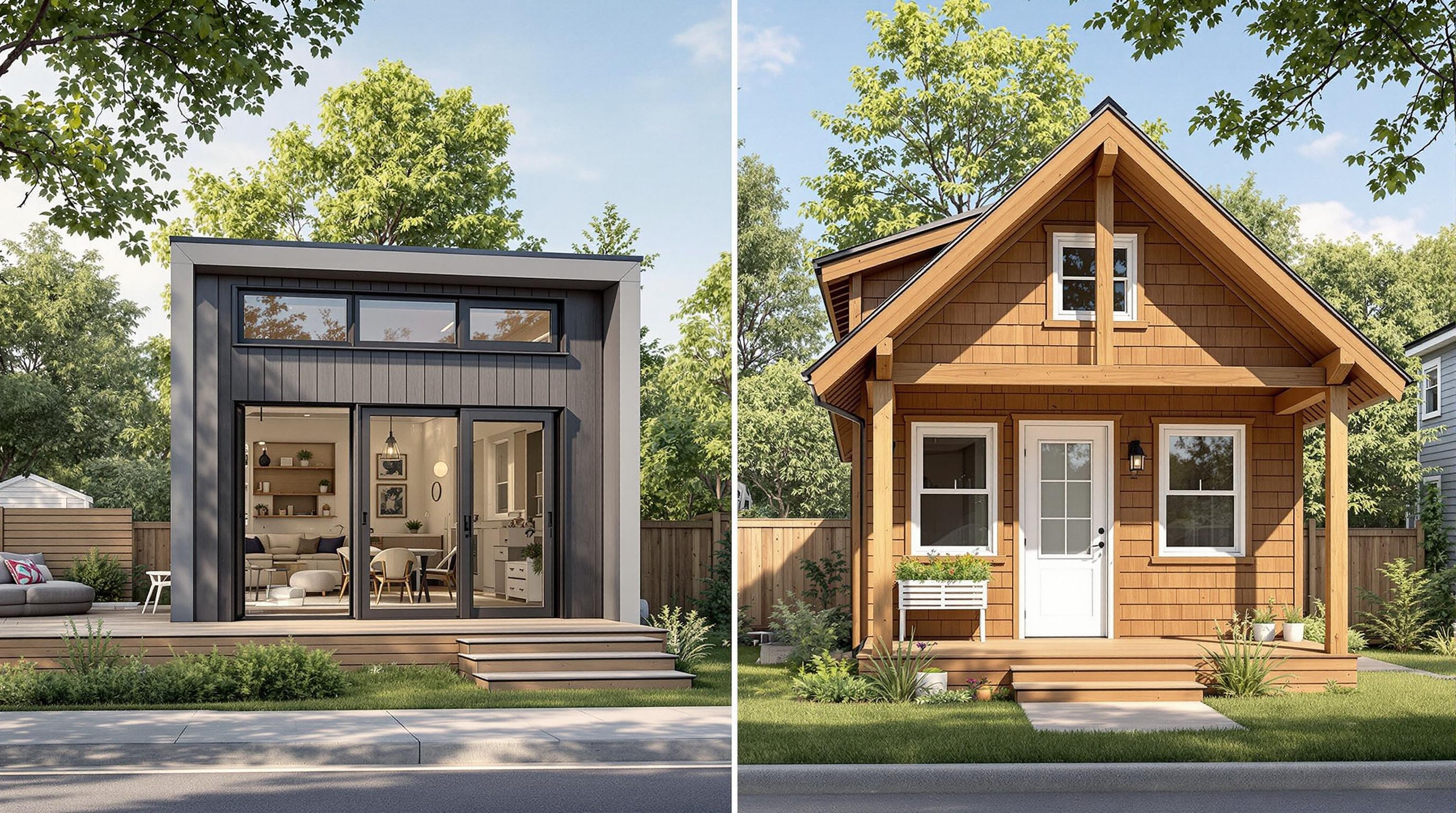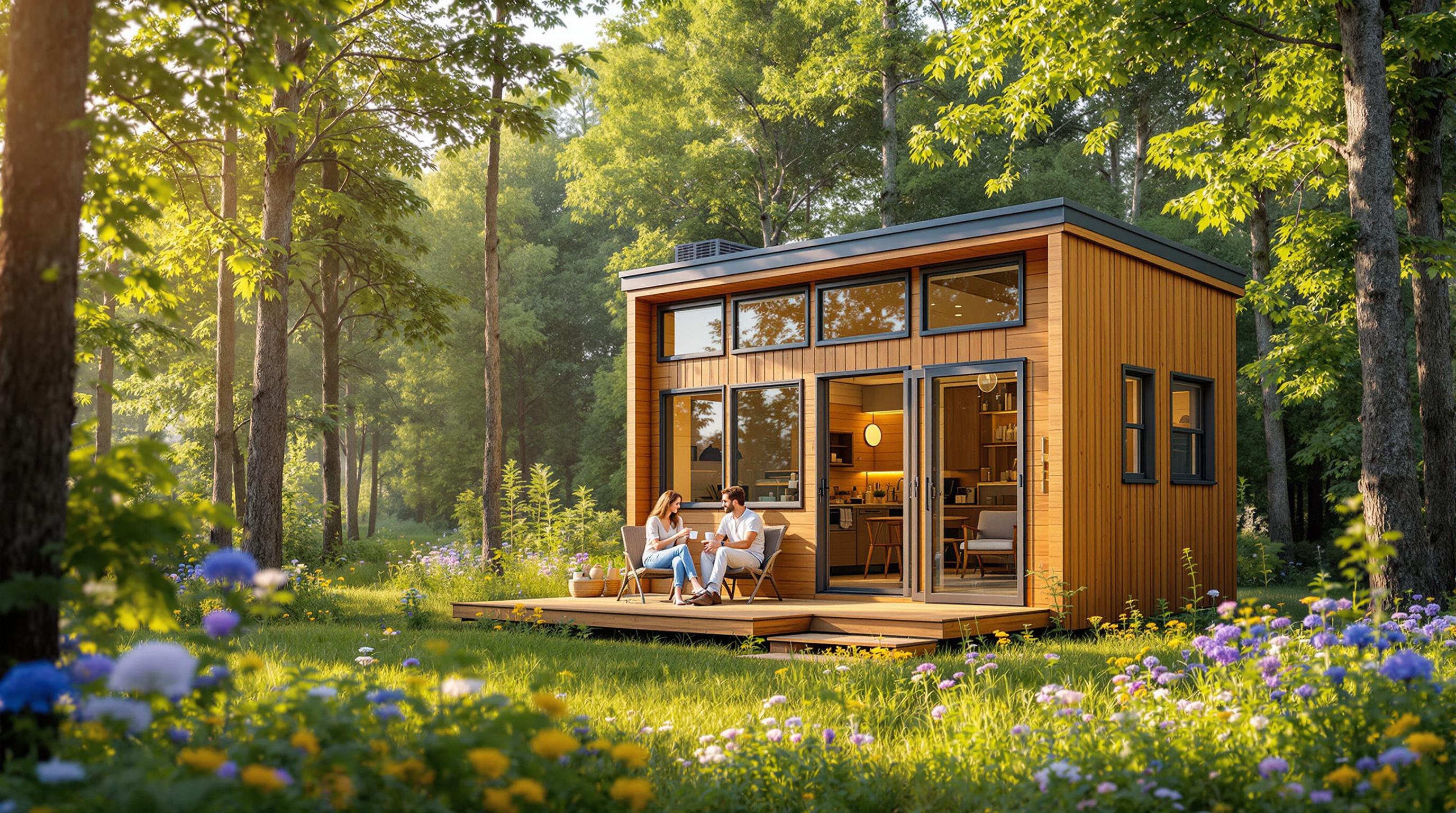Looking to downsize but torn between a tiny house and RV? Here's what you need to know:
Quick Answer: Choose an RV if you want mobility and lower upfront costs ($30k-60k). Pick a tiny house if you prefer staying put and can handle higher initial investment ($50k-150k).
| Feature | RV Living | Tiny House Living |
|---|---|---|
| Cost | $30k-60k | $50k-150k |
| Size | 200-400 sq ft | 100-400 sq ft |
| Mobility | Drive anywhere | Need special towing |
| Setup Time | 30 mins | Several hours |
| Lifespan | ~10 years | 20-30 years |
| Monthly Costs | $500-1000 | $300-600 |
| Best For | Frequent travelers | Semi-permanent living |
Key Differences:
- RVs are built for travel, tiny houses for staying put
- RVs lose 30-45% value in 5 years; tiny houses can maintain value
- RVs offer quick setup; tiny houses need more planning
- RVs have fixed layouts; tiny houses are customizable
Monthly Costs Breakdown:
- Parking: $400-800
- Utilities: $100-170
- Insurance: $50-150
- Maintenance: $100-300
73% of Americans might consider downsizing, with tiny homes being 87% cheaper than regular houses. Both options mean less stuff and lower bills - your choice depends on whether you want to roam or set roots.
Related video from YouTube
What Are Tiny Houses and RVs?
Tiny houses and RVs offer compact living, but they're quite different. Let's break it down:
Tiny Houses: Home in Miniature
Tiny houses are exactly what they sound like: small homes. They pack all the essentials into 100-400 square feet. Built like regular houses, just smaller.
| Feature | Tiny House Details |
|---|---|
| Size | 100-400 sq ft |
| Build | Standard home materials |
| Foundation | Fixed or wheeled |
| Code | Follows IRC Appendix Q (2018) |
| Purpose | Long-term living |
Tiny houses boomed after the 2009 housing crisis. They use clever tricks to maximize space:
- Hidden storage
- Sleeping lofts
- Multi-use furniture
- Compact doors and stairs
RVs: Homes on Wheels
RVs come in various shapes and sizes:
| RV Type | Length | Sleeps | Best Use |
|---|---|---|---|
| Class A | 25-45 ft | 4-8 | Luxury travel |
| Class B | 16-24 ft | 2-4 | Easy driving |
| Class C | 20-32 ft | 4-8 | Family trips |
| Travel Trailer | 12-35 ft | 2-8 | Towing flexibility |
| Fifth Wheel | 25-40 ft | 4-8 | Extended stays |
| Truck Camper | 8-11 ft | 2-4 | Pickup owners |
Each type has its perks:
- Class A: Most home-like
- Class B: City-friendly
- Class C: Comfort meets drivability
- Travel Trailers: Versatile, need towing
- Fifth Wheels: Spacious, require pickup
- Truck Campers: Ultra-mobile
The big difference? Tiny houses are for settling down. RVs are for hitting the road. Park Model RVs sit in the middle - technically RVs, but with up to 400 square feet for longer stays.
Starting Costs
Upfront Expenses
Tiny houses and RVs have different price tags:
| Type | Price Range | Common Models & Costs |
|---|---|---|
| Tiny Houses | $30,000 - $60,000 | - Tumbleweed Cypress: $102,959 - Tumbleweed Elm: $98,959 - Tumbleweed Farallon: $91,000 |
| RVs | $5,000 - $300,000 | - Used Models: $5,000 - $30,000 - New Class B: $80,000 - $140,000 - New Class A: $150,000 - $300,000 |
Tiny houses cost per square foot:
| Square Footage | Total Cost |
|---|---|
| 200 sq ft | $30,000 |
| 400 sq ft | $65,000 |
| 600 sq ft | $100,000 |
Beyond the Base Price
You'll need to budget for more than just the unit:
Tiny House Setup:
- Foundation: $6,000 - $9,000 ($5.50 - $8 per sq ft)
- Trailer: $4,500 - $9,000
- Building permits: $200 - $2,000
- Property survey: $100 - $600
- Delivery: $1,179 (Colorado) to $6,579 (East Coast)
RV Setup:
- Hookup equipment: $200 - $500
- Basic supplies: $500 - $1,000
- Insurance setup: $500 - $1,000
Financing options (on $60,000):
| Option | Interest Rate | Monthly Payment | Total Interest |
|---|---|---|---|
| RV Loan | 4.0% | $443.81 | $19,886 |
| Personal Loan | 10.9% | $1,027 | $26,270 |
| HELOC | 5.02% | $322 | $55,953 |
Land costs vary wildly:
- Alabama: $2,000 per acre
- New Jersey/New York: $13,000+ per acre
Tiny houses need building permits and often can't get standard mortgages. RVs have simpler financing but higher interest rates.
Monthly Costs
Parking Fees
Parking costs vary:
| Location | Monthly Cost | Includes |
|---|---|---|
| RV Resort (Lake View) | $640 | Pool, hot tub, fire pits, Wi-Fi |
| Basic RV Park | $500 | Standard hookups |
| Private Land | $430/year | Property taxes |
Bills and Repairs
Utility and maintenance costs:
| Expense | Tiny House | RV |
|---|---|---|
| Electricity | $40-60 | $40 (with AC) |
| Water/Sewage | $20-40 | In park fees |
| Internet | $50-70 | Often included |
| Maintenance | $100-200 | $200-300 |
A standard house costs about $600/month for utilities, including Wi-Fi, cable TV, water, power, and maintenance. An RV dweller paid just $40 for electricity with 24/7 AC at their resort.
Insurance
Coverage costs:
| Type | Monthly Cost | Covers |
|---|---|---|
| RV | $50-100 | Vehicle and living space |
| Tiny House (Foundation) | $100-150 | Like standard home insurance |
| Tiny House (Wheels) | $75-125 | Often RV insurance |
Save Money:
- Park long-term
- Use solar panels
- Do regular maintenance
- Bundle insurance
- Check if RV park includes utilities
Both options can be cheaper than standard housing, but costs depend on location and lifestyle. Off-grid setups might cost more upfront but can cut monthly bills.
Daily Life
Moving Around
| Aspect | RV | Tiny House |
|---|---|---|
| Travel Frequency | Daily/weekly moves | 1-2 moves per year |
| Setup Time | 15-30 minutes | Hours + pro help |
| Driving Requirements | Standard license | Commercial transport |
| Road Access | Most highways/campgrounds | Limited by size/weight |
RVs are built for the road. You can pack up and go in under an hour. Tiny houses? Not so much. They need planning and pro movers.
Space and Storage
| Feature | RV | Tiny House |
|---|---|---|
| Size Range | 16-45 feet | 100-400 sq ft + loft |
| Storage Options | Built-in compartments | Custom cabinets, closets |
| Layout | Fixed design | Custom floor plans |
| Weather Protection | Basic insulation | Full home insulation |
RVs come as-is. Tiny houses? You can design them from scratch. Want a full closet? Go for it.
Meeting People
| Setting | RV Life | Tiny House Life |
|---|---|---|
| Community Type | Short-term neighbors | Long-term residents |
| Social Spots | Campgrounds, RV resorts | Tiny home villages |
| Events | Travel meetups | Community gatherings |
| Parking Options | Parks, RV parks | Private land, communities |
Take Shilo RV Village. It's a mix of both worlds:
- 40+ spots for RVs and tiny homes
- Monthly community events
- Shared amenities
- Mix of residents
The big difference? RVs are all about moving. Tiny houses? They're about staying put.
Your daily life boils down to this:
- RV Life: New place every day? No problem.
- Tiny House: Set up once, stay a while.
- Both: Places like Shilo welcome both styles.
Choose based on how often you want to move and who you want as neighbors. RVs for the wanderers, tiny houses for the settlers.
sbb-itb-2ef3f3a
Making It Your Own
Tiny House Changes
| Change Type | Options | Cost Range |
|---|---|---|
| Layout | Custom floor plans, lofts, hidden storage | $6,000 - $100,000 |
| Materials | Reclaimed barn wood, marble counters | $500 - $5,000 |
| Features | Full kitchen, outdoor shower | $1,000 - $10,000 |
| Utilities | Off-grid systems, solar panels | $2,000 - $15,000 |
Tiny houses are all about control. Want a king bed with storage? You got it. Full-size stove? No sweat. Your choices drive the cost:
- Basic cabin kit: $6,000 - $8,000
- 200 sq ft custom: $30,000
- 400 sq ft custom: $65,000
- 600 sq ft custom: $100,000
RV Changes
| Update Type | Quick Fixes | Time | Cost |
|---|---|---|---|
| Walls | Peel-stick wallpaper, paint | 1-2 days | $50-200 |
| Counters | Contact paper, epoxy | 1 day | $11-100 |
| Storage | Shelves, cabinet organizers | 2-4 hours | $20-150 |
| Lighting | LED fixtures, new bulbs | 1-2 hours | $30-200 |
Real RV owners are getting creative:
"It's so colorful now. I walk in and it feels like home", says Heather McLarry. She spent under $1,000 on her 2015 camper, using $11 contact paper for countertops and scoring cheap furniture on Facebook Marketplace.
Quick RV updates that pack a punch:
- Paint cabinets (McLarry went sage green in the kitchen, black in the bedroom)
- Stick-on tile backsplash
- New cabinet knobs
- Updated light fixtures
- Contact paper on counters
Just remember: RVs have their limits. You can't move walls or change the structure. But small tweaks can make a BIG impact.
Rules and Access
Local Laws
| Location Type | Tiny House Rules | RV Rules |
|---|---|---|
| Private Land | Building permits, foundation requirements | Temporary stays only in most areas |
| RV Parks | Must meet RVIA standards | Welcome with proper certification |
| City Lots | ADU zoning needed | Often not allowed |
| Rural Areas | Less strict rules | Allowed with time limits |
Tiny houses and RVs have different rules:
Tiny Houses:
- Need permits
- Must follow local codes
- Often need a permanent foundation
- Have minimum size rules
- Pay property taxes
RVs:
- Can't stay long (14-30 days)
- Must move around
- Need vehicle registration
- Require insurance
- Can't set up permanently
Where You Can Go
| Option | Stay Length | Monthly Cost | Hookups |
|---|---|---|---|
| BLM Land | 14 days max | Free | None |
| RV Parks | No limit* | $400-800 | Full |
| Private Land | Varies | $200-500 | DIY |
| State Parks | 14 days max | $25-45/day | Basic |
*Some parks have seasonal limits
RV spots:
- Truck stops (overnight)
- Walmart lots (check policy)
- National parks (reserve)
- Casino lots (often free with gaming)
Tiny house options:
- RV parks that accept them
- Your own land (check zoning)
- Tiny house communities
- Mobile home parks
The Escapees RV Club has parks across the U.S. with various stay options. Both RVs and tiny houses usually pay $400-800 monthly for full hookups.
"The International Residential Code (IRC) is the standard for homes on a foundation, while the National Fire Protection Association (NFPA) standards apply to Recreational Vehicles (RVs), which are often restricted to RV parks."
Before picking a spot, check:
- Local zoning laws
- Stay limits
- Utility access
- Parking fees
- Insurance needs
Future Worth
Value Over Time
| Type | Initial Cost | 5-Year Value Loss | Resale Market |
|---|---|---|---|
| RV | $30,000-60,000 | 30-45% | Large, established |
| Mobile Tiny House | $30,000-50,000 | 20-30% | Limited, growing |
| Foundation Tiny House | $50,000-150,000 | 0-15%* | Location dependent |
*When built on owned land
Mobile tiny houses and RVs? They lose value fast, like cars. Buy a tiny house on wheels, and its price starts dropping immediately. And selling? It's tougher than with RVs - the market's smaller.
But tiny houses on foundations? Different story. Own the land and build it right, and your house might keep its value. It could even go up in price, just like regular homes.
How Long They Last
| Feature | Stationary Tiny House | Mobile Tiny House | RV |
|---|---|---|---|
| Expected Lifespan | 20-30 years | 10-15 years | 10 years |
| Main Wear Points | Roof, siding | Frame, wheels | Engine, seals |
| Maintenance Needs | Every 2-3 years | Yearly | Every 6 months |
| Build Materials | Wood, SIP panels | Light materials | Fiberglass, aluminum |
Why do stationary tiny houses last longer? Simple:
- They don't move
- They're built stronger
- They're insulated better
- They get regular TLC
RVs and mobile tiny houses? They take a beating from:
- Road vibrations
- Weather exposure
- Weight shifts
- Constant moving
Want your tiny home to last? Here's what to do:
- Check seals and joints
- Fix water damage ASAP
- Keep wheels and frame solid
- Update paint and coating
- Clean gutters and vents
Remember: lifespan depends on quality and care. A well-built stationary tiny house? It could last 20-30 years with basic upkeep. RVs? They often need major repairs or replacement around 10 years.
Which One Is Right for You?
Your Way of Life
| Lifestyle Factor | RV Better If You... | Tiny House Better If You... |
|---|---|---|
| Travel | Move weekly/monthly | Stay 6+ months per spot |
| Work | Remote/seasonal jobs | Fixed location work |
| Space Needs | 200-400 sq ft enough | Want 300-400 sq ft |
| Parking | Use campgrounds | Have land/rent spot |
| DIY Skills | Basic maintenance | Like building/fixing |
| Climate | Follow good weather | Stay in one climate |
RVs are great if you:
- Need frequent moves for work
- Can't get enough of new places
- Don't mind campground living
- Want a ready-to-go home
- Enjoy meeting fellow travelers
Tiny houses shine if you:
- Dream of building your own place
- Plan to put down roots
- Need better weather protection
- Want a small garden
- Crave more storage
Your Money Plan
| Cost Factor | RV | Tiny House |
|---|---|---|
| Starting Price | $30k-60k used | $50k-150k new |
| Monthly Parking | $500-1000 | $300-600 |
| Insurance | $100-200/month | $50-100/month |
| Fuel/Moving | $200-500/move | $1000-2000/move |
| Repairs | Every 6 months | Every 2-3 years |
| 5-Year Value Loss | 30-45% | 0-30% |
Short-term (1-2 years)? RVs win:
- Quick start
- Less upfront cash
- Easy to sell
- More loan options
Long-term (3+ years)? Tiny houses shine:
- Lower costs over time
- Built to last
- Less upkeep
- Potential value boost with land
But it's not just about the numbers. Think about:
- How often you'll hit the road
- Where you'll park
- Your fix-it skills
- Future selling plans
Conclusion
Choosing between a tiny house and an RV boils down to your lifestyle, budget, and long-term goals.
| Factor | RV Living | Tiny House Living |
|---|---|---|
| Mobility | Weekly/monthly moves | Semi-permanent spots |
| Build | Lightweight, shorter lifespan | House-grade, durable |
| Cost | $30,000-60,000 used | $50,000-150,000 new |
| Monthly Expenses | Higher parking fees | Lower lot rent |
| Moving | Drive anywhere | Permits, special towing |
| Space | 200-400 sq ft, built-in storage | 300-400 sq ft plus lofts |
Choose an RV if you:
- Want immediate travel
- Enjoy campground socializing
- Need quick setup
- Have a smaller budget
- Plan 1-2 years of travel
Pick a tiny house if you:
- Prefer staying put longer
- Need better weather protection
- Like customization
- Can handle higher upfront costs
- Plan 3+ years of tiny living
"The choice between tiny house vs. RV living will depend on individual needs, preferences, and lifestyle choices." - Wind River Built
20% of leisure travelers have worked remotely from an RV in the past 2 years, showing both options suit modern living.
There's no wrong choice. It's about what fits YOUR life. Freedom to move or a solid home base? Quick start or long-term value? Ready-made or custom-built? Your perfect match depends on your needs and plans.
FAQs
RV vs Tiny Home: Which is Better?
It depends on what you're after:
| Factor | RV | Tiny House |
|---|---|---|
| Travel | Frequent moves | Stationary |
| Cost | Under $30k | $50k+ |
| Lifestyle | Campground | Private home |
| Build | Quick setup | House-grade |
"Want a mobile lifestyle? Go RV. Dream of a downsized, custom home? Tiny house is your answer!" - Rover Tiny Homes
RV Living vs House: Cost Comparison
RVs are cheaper because:
- Lower heating/cooling costs
- Less maintenance
- Fewer items to buy
- Smaller utility bills
Why Choose a Tiny House Over an RV?
Build a tiny house if you want:
- Custom layout and design
- Better materials
- Improved weather protection
- Unique features
- Long-term value
Cost: Tiny Home vs RV
Here's the breakdown:
| Option | Price | Best For |
|---|---|---|
| Used RV | Under $30k | Budget buyers |
| New RV | $30k-60k | Mid-range |
| Tiny House | $50k-150k | Long-term investment |
"RVs offer some customization, but tiny homes let you change the overall look and layout." - Rover Tiny Homes



